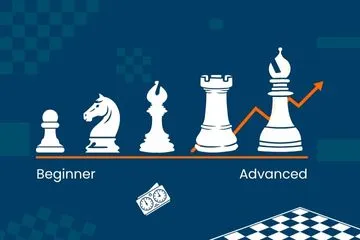Chess is a classic game of strategy, intellect, and patience. The most important question any curious rookie or determined player with visions of grandmaster glory will ever ask is the following: how long does it take to rise from the ranks of beginner to advanced in chess? There is, however, more to it than you might think. Also, it would especially depend on the way you learn, practice regularly (if applicable), quality of resources used, personal goals, etc. OR
In this article, we will cover everything about to play chess online for fun to participating in tournaments, giving you an idea of what it takes to get to the level you want.
The Learning Curve in Chess: Understanding Its Nature
First, let us define the types of chess players:
Novice: Understands basic chess rules (how each piece moves, castling, en passant, check/checkmate)
Find Our Beginner Friendly Chess Classes!
Intermediate: Knows opening principles and basic tactics (forks, pins, skewers) and plays through their games to find their blunders.
Learn More About our Chess Class for Intermediate Players.
Advanced: Understands strategy and endgames well and is capable of calculating a few moves out in advance. Many players rated between 1600 and 2000 will be considered chess hustlers with significant experience on the internet. com or Lichess.
If you are just getting started with chess and have no prior experience learning the basic rules of chess (1–2 weeks).
Take your skills to the next level with our Advanced Chess Classes!
Step 1: Learning basic rules
It all starts with the basics. If you are a beginner, then your very first goal is to learn the basic rules of chess perfectly. Depending on how much time you allot, this stage lasts a few days to a couple of weeks. You’ll need to understand:
How each piece moves
Unique regulations (castling, promotion, en passant)
Check and checkmate – the very ideas,
How to set up the board
Tip: Don’t rush this step. Knowing the basic chess rules will help you avoid mistakes that beginners tend to make.
Also Read: How to play chess for beginner: The Ultimate Guide
Stage 2: Learning To Be Tactical (1-3 Months)
After mastering the fundamentals, it’s about time to move on to tactics. This is where the action really starts. The order of things: You will learn typical pattern stems like forks, pins, discovered attacks, mating nets, etc. You’ll also start getting a broad eye and plan the next few moves ahead.
To develop your chess strength at this point, you need to do puzzles, play, and review your games after finishing them. With steady practice, most learners reach a reasonable tactical level in 1 to 3 months.
Tools to help you:
Apps and websites for chess puzzles
Beginner-friendly books
YouTube and Twitch streamers.
Also Read: Tactics or Strategy First?
Stage 3: Development of Position Acquisition and Tactics (3 to 6 months)
Within Identifying Tactics, you can now know what kinds of moves exist, but we need to identify which moves are better than others. This is the strategic phase to improve chess skills. You’ll learn about:
Controlling the center
Piece development
Pawn structure
Weak squares and outposts
Opening principles
Around this time, players begin incorporating structured chess into their work and may hire coaches or join online classes. You will also begin looking at great games, openings, and fundamental endgames.
If you are a dedicated learner and practice daily for at least 3 to 6 months, having a feedback loop will be really helpful.
Also Read: Top Online Academies with Effective Training to improve chess skills
Stage 4: Towards the Intermediate Level (6 Months to 1 Year)
It requires a decent balance of theory and practice, but a year will be enough for most players to achieve the intermediate level. At this point, you are not just making moves; you are making plans. You know how to transition from the opening into the middlegame and how to convert tiny advantages into victories.
By this stage, you have to play chess online or live on a regular basis. Fighting different styles challenges you to think differently and find holes in your own game. You should also begin reviewing your games—identify where things went awry and what could have gone better.
Also Read: 10 rules of chess
Stage 5: Competing At A High Level (1–2 Years Or Longer)
It takes a long time to get to a high level in chess, usually 1–2 years or more. This is the stage where we solidify your understanding, perfect complex endgames, expand your opening repertoire , and firm up calculation skills. It’s not just about winning games — it’s why every move.
For intermediate and advanced players, serious chess training usually involves hiring titled coaches, playing in rated tournaments, and studying works by legends like Kasparov, Fischer, and Carlsen.
This is also the point when you have to be patient. While progress will sometimes stall, you will continue to improve your chess skills if you keep at it.
Also Read: what is 50 move rule in chess?
Final Thoughts: Your Chess Journey with the Kingdom of Chess
The amount of time it takes to progress from being a beginner to an advanced chess player differs for everyone. Still, a year of dedication can create amazing results for the majority of players. Skillful is the name of the game — the key that never fails is practice, curiosity, and collaborative drive.
Kingdom of Chess wants to assist your journey as a dedicated novice chess player _ however, at the same time gives a fantastic platform for those who enjoy play chess online from time to time—our expert-led chess training programs offer short lessons, whether you are just starting or preparing to level up.
So why wait? Step into the Kingdom of Chess and make your move – every single action brings you closer to being the ultimate chess master!



